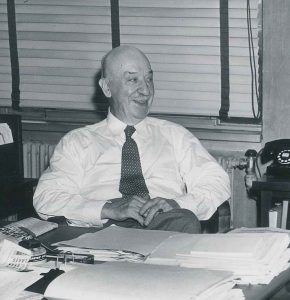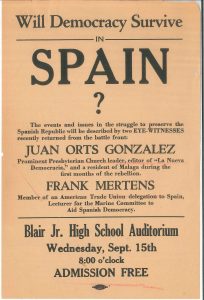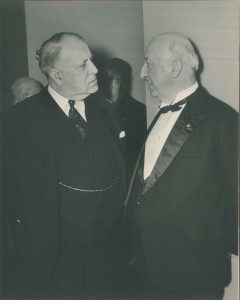
In 1901, a young man named William F. Montavon (1874-1959) finished his studies at Catholic University in order to marry his wife, Mary Agnes Burrow. Little did he how the next 50 years would be a whirlwind of international travel, legal advocacy, and global upheaval. To understand the story of Montavon is to understand the story of the National Catholic Welfare Conference (NCWC) Legal Department. For 26 years, between 1925-1951, Montavon would serve as the director of the fledgling department, shaping its mission. For the American Catholic Church of the time, Montavon was regarded as “the Law.”
Montavon’s path to the NCWC was an indirect one. From 1902-1915, he served as the superintendent of schools in the Philippines. At the end of his tenure, he took an appointment as U.S. Commercial attaché to Peru, Bolivia, Ecuador and Chile. From there he became the executive representative for the International Petroleum Company in Peru. Returning to the United States in 1925, he obtained the directorship of the Legal Department. With two decades experience abroad, Montavon was poised to turn the Legal Department’s focus from exclusively domestic issues to one contemplating the broader world.
Originally established in 1919 as a NCWC office, the Legal Department worked to track and advise Catholic dioceses and organizations on changes to state and federal law. It also served to represent the NCWC in the courts of law and public opinion. Among its most frequent areas of concern were (and continues to be) educational reform, tax policy, civil rights, immigration, and marital legislation. From the very beginning, the department has been at the forefront of legislative and legal battles over the role of parochial schools in the United States and their relations with both state and federal governments, including in the landmark Oregon School Case.

Under Montavon’s directorship, the department expanded to include work on the behalf of Catholics abroad and the vulnerable domestically. The department entered into the complicated diplomatic situation surrounding the Mexican Cristero War (1926-1929) and its aftermath throughout the 1930s. Montavon himself traveled to Mexico to report on the situation of the Church in the countryside. This trip, and its ensuing report, was instrumental in the Mexican government’s decision to allow the return of the clergy and legal public worship. Pope Pius XI awarded Montavon the Knight Commander of the Order of St. Gregory the Great in 1929 for his work in Mexico.
This period also witnessed the department’s advising and reporting on the status of religious legislation and freedoms throughout the various Latin American republics, Haiti, and the Philippines. Through Montavon’s service as a NCWC News Service correspondent in Spain in 1931, the Legal Department soon became closely involved in Spanish events throughout the 1930s, in particular the Spanish Civil of 1936-1939.
The department also worked on domestic social policies, including the growing number of eugenics, sterilization, and birth control bills emerging in state legislatures across the country throughout the interwar period. Simultaneously, Montavon led efforts to oppose the enactment of a national quota system as specified in the Immigration Act of 1924. Questions of tax policy and draft enactment also emerged as pressing issues for the Church throughout Montavon’s tenure.

By the 1930s, with the Great Depression ongoing, the department kept its associates abreast of developments with governmental relief efforts and the changing role of the federal government in the economic and domestic spheres. Of particular import to the department was New Deal legislation that began to fundamentally impact both the social mission and employer status of the Church. In addition to supporting workforce relief efforts, the department closely followed developments in Social Security legislation and how it impacted clergy and Church staff. As the clouds of war gathered in the last half of the decade, the topic of Selective Service became of increasing importance to the NCWC as the draft status of seminarians remained uncertain. With Montavon testifying before Congress on numerous occasions, the department worked to better define the draft eligibility and social security expansion, as well as working to spread knowledge about the need for relief in war-torn parts of the world.
In the post-war period, the Legal Department continued much of its prior work, but took a greater role in civil rights and refugee legislation and legation. Montavon retired from the Legal Department in 1951, with countless well wishes arriving from dioceses across the country and world.
The Archives holds the following collections mentioned in this post:
The William Frederick Montavon Papers
United States Conference of Catholic Bishops Office of General Counsel/Legal Department
